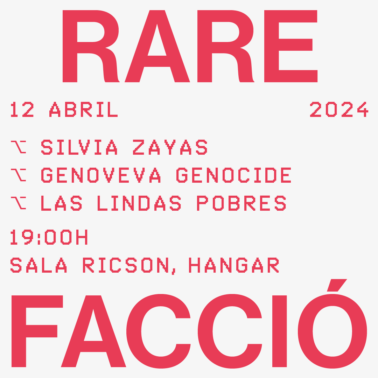Rarefacció: Sílvia Zayas / Genoveva Genocide / las lindas pobres

On 12th April Hangar presents the second session of Rarefacció 2024, a listening cycle curated by Sergi Botella, part of the Audio Formal/Politics of Listening research line, which aims to present proposals that revolve around music and sound from an experimental and unconventional point of view. The guests for this first session are Sívia Zayas, Genoveva Genocide and las lindas pobres.
Practical information
Date: 12 April 2024
Doors open: 6.30 pm
Advance tickets: 8 € here / 9 € at the door.
Sílvia Zayas
Her work lies at the intersection of live art, video and choreography, deforming the boundaries of language and opening up space for the suspension of meaning. She explores the creation of homemade, rudimentary and low-tech devices to make live cinema. She is interested in the extraordinary and the almost invisible phenomena, those that can be perceived through sustained bodily forms of attention.
At Rarefacció she will present ruido ê (the film), a musical documentary with thriller overtones that is interrupted and torn to shreds. Noise, beyond its acoustic impact, becomes a difficulty of legibility and narrative purity, a shock between languages, a synaesthetic buzz that hacks the vision and makes it erotic at the same time.
All the underwater images were filmed in underwater urban areas where, paradoxically, the Torpedo torpedo electric rays live. These areas, which the artist calls post-punk, are in a state of constant urban transformation. From the maritime works for the extension of the breakwater at San Sebastián beach in Barcelona, with a metal hand crane that throws concrete buckets, to the entire post-industrial area between the mouth of the river Besós, Sant Adriá, and the Pont del Petroli in Badalona, whose pillars collapsed during the storm Gloria. Rubbish and underwater architecture reappropriated by various creatures.
The filmic has served as an alibi to weave networks and methodological research with scientists (especially Claudio Barría, shark and ray specialist), divers and other artists around questions of somatic attention, perception, vulnerability and resistance.
ruido ê has been supported by Artea Research and Scenic Creation. It was part of GRAPA, a pilot programme promoted by Hangar and CCCB, UOC and Hac Te. The film was supported by TBA21 on st_age and by “Composing knowledge to imagine and build sustainable futures 2021” of the Daniel and Nina Carasso Foundation.
Genoveva Genocide
It represents the oxidation of the human species, but with a hopeful and utopian end to the struggle. The degradation of life and the planet is both a natural cause and a reaction to our way of life or our self-centredness, our molecular structure undergoing drastic and irreparable changes caused by our own thermodynamic process. Their sound is reminiscent of early industrial music, electro-acoustic and sound art.
Genoveva Genocide manages to evoke these compositions by demonstrating her virtue of creating a sonic environment with rudimentary devices and instruments made of rusty iron collected from the same places where she exhibits her art, which she adapts with different sources and materials. In its lo-fi physiognomy, we can see that it preserves the balance between the primary process and its subsequent treatment, its nature is electrifying, with different tones full of overtones that first modulate discreetly and as a single body, then hatch freely as autonomous, each one manoeuvring on its own, while an intimidating discourse sounds, a deep and dense atmosphere, with a latent rhythm that increases the mystery of its aura and with a palpitating voice.
They describe iron sonically as a resistant and corrosive chemical element, so their way of interpreting it could not be more precise in the development of a musical landscape that lacks lustre, with a multitude of corroded metallic textures that merge in a radioactive context and are not suitable for the subsistence of any organism. The rusting of their instruments, detailing the process of wear and tear, from a completely natural state, born in a beautiful and ordered place, which over time is invaded by external particles, symbolises the pain that each person suffers from these physical changes. It is a mixture of delicacy, rawness, saturation and disorder in the same track.
las lindas pobres
las lindas pobres is Magui Dávila (a.k.a. Felisa). She works in research and creation with artistic practices of graphic and sound desktop publishing. She is curator of the programmes Sonido por fricción (Matadero), Manuales de reparación y sonidos cósmicos (MACBA) and Corrimientos de voces at CA2M. She is one half of deleteD_action_sound, a slow dance electronic music duo. She hosts the show La ficción de la maleta de discos on La Casa Encendida Radio. In recent years she has been making club techno from the inside, on dance floors and in listening rooms in Madrid. At Hangar she will present una historia (rota) de t3chno m4rr0n.
Supported by:

Categories: Agenda Hangar | Tags: rarefaccio
